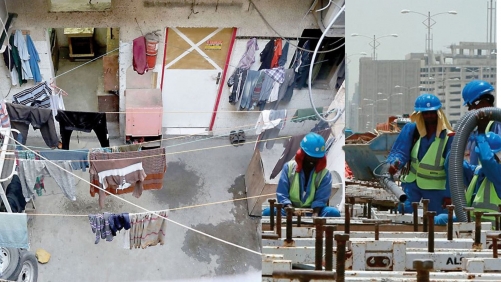Migrant Worker Challenges in Bahrain's Construction Sector: A Trade Union Study Reveals Deep-Rooted Issues
TDT | Manama
Email : editor@newsofbahrain.com
A recent study by the Building and Wood Workers' International and the General Federation of Bahrain Trade Unions has shed light on the challenges faced by migrant workers in Bahrain's construction sector.
While acknowledging Bahrain's relatively robust legal framework protecting worker safety and health, the study highlights inconsistencies in enforcement due to overlapping jurisdictions and a shortage of inspection personnel.
The study revealed a wide range of working and living conditions for migrant construction workers. While the "Kafala" sponsorship system is identified as a major obstacle to fair labour practices, the study emphasises the critical issue of delayed wages, alongside concerns about occupational safety at worksites and in accommodations, and indicators of forced labor.
The study calls for a comprehensive action plan developed through tripartite social dialogue—involving the government, employers, and workers—to address these key challenges. A three-party committee is proposed to discuss national circumstances and ensure adherence to fundamental labor rights.
The Scale of the Problem
The study notes that the number of migrant workers in Bahrain has risen to approximately 680,000 over the past two decades, primarily from the Indian subcontinent, Southeast Asia, and, more recently, Africa. The study aims to understand the contribution of migrant workers to the construction sector, identify legal and practical shortcomings affecting their rights, assess Bahrain's compliance with international labour standards, and evaluate migrant workers' access to redress.
While the government has modernised the legal and procedural framework for real estate development and construction projects to attract foreign investment, the study acknowledges complaints from Bahraini businesses about competition from foreign companies. Despite this, Bahrain's ease of obtaining building permits ranks 17th out of 190 countries in the World Bank's Doing Business report. The construction sector has maintained growth, although its contribution to national income has fluctuated.
Worker Housing Crisis
The study highlights critical occupational safety and health issues in worker housing, often characterised by overcrowding, poor sanitation, and lack of maintenance. Two types of housing are identified: registered accommodations provided by larger companies, which adhere to certain standards, and unregistered accommodations, often housing undocumented workers and lacking oversight.
Estimates suggest over 1400 unregistered worker accommodations, with some housing up to 100 workers in a single dwelling. Over 2200 registered worker accommodations are subject to inspection. The study underscores the urgent need for improved living conditions for migrant workers in Bahrain.
Trade Union Intervention
The study suggests several areas for intervention by Bahraini trade unions, including a deeper understanding of migrant workers' needs and demands. Key recommendations include:
Improving Occupational Safety and Health: Conducting comprehensive reviews of relevant legislation, identifying gaps through regular reports to government agencies, and forging partnerships with organisations like the Bahrain Society of Engineers, as well as the Bahrain Chamber of Commerce and Industry, to advocate for legislative amendments. Collaboration with the Council of Representatives and the Shura Council is also crucial for legislative improvements.
Training and Awareness: Training union representatives to effectively monitor occupational safety and health violations, launching awareness campaigns for migrant workers on safety procedures, collaborating with embassies of workers' home countries, and establishing social media networks to disseminate information on safety standards and workers' rights. Facilitating connections with trade unions and developing pre-departure awareness programs in workers' home countries are also recommended.
Related Posts

